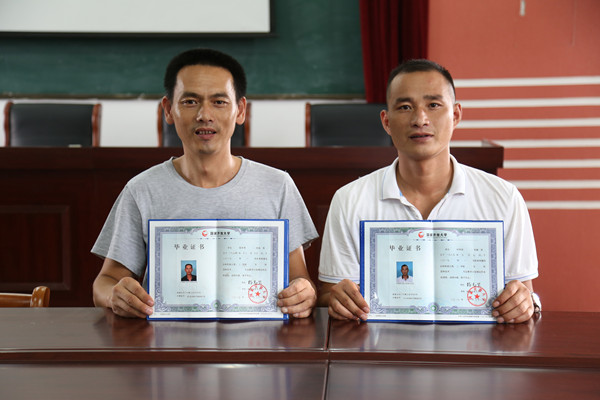 “The farmers’ courtyards with their white walls and grey tiles are well-arranged; all the cement paths in the village are wide and flat; and the fields and footpaths are crisscrossed with shady fruit trees……” To the villagers of Pipa Village, Shuiningsi Township, Bazhong City in Sichuan Province, this description is closely related to village Party secretary Yang Bin, a junior college student in the rural administration programme of the Open University of China (OUC). Yang Bin is a well-known national “Secretary on crutches” and has been honoured with the Fifth National Self-Improvement Example award. He has met Xi Jinping, general secretary of the CPC Central Committee, and Li Keqiang, premier of the State Council.
“The farmers’ courtyards with their white walls and grey tiles are well-arranged; all the cement paths in the village are wide and flat; and the fields and footpaths are crisscrossed with shady fruit trees……” To the villagers of Pipa Village, Shuiningsi Township, Bazhong City in Sichuan Province, this description is closely related to village Party secretary Yang Bin, a junior college student in the rural administration programme of the Open University of China (OUC). Yang Bin is a well-known national “Secretary on crutches” and has been honoured with the Fifth National Self-Improvement Example award. He has met Xi Jinping, general secretary of the CPC Central Committee, and Li Keqiang, premier of the State Council.
There are many village Party secretaries like Yang Bin throughout China, all of whom are have one thing in common: to keep learning by themselves and to lead the villagers out of poverty by making use of what they have learned. They are fully aware that access to, and the popularisation of, education should be prioritised as part of poverty reduction and alleviation measures, and that only education can pull out “the root of poverty.” As such, they not only help the farmers develop industry to shake off economic poverty but also focus on education in order to realise poverty alleviation through access to education and stop poverty from being passed on.
The OUC, where people like Yang Bin seek knowledge, is “a university without walls”. Its 3.63 million active students make it a genuine “mega-university”. Seventy percent of the students come from the grass-roots communities and 55 percent are from central and western regions of China. Ever since its establishment, the OUC has made equal access to education its mission, providing education for everyone by breaking through the limits of time and space. The OUC is rooted in the grassroots of the society, bringing top quality educational resources to those who are in great need of them.
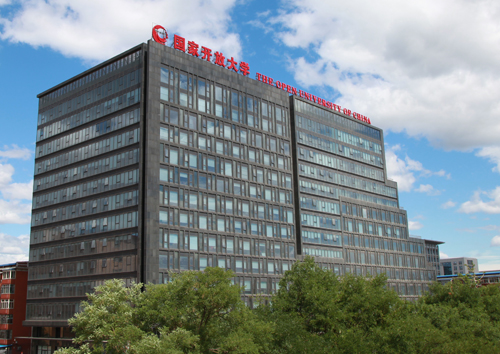
The OUC Headquarters
The predecessor of the OUC is the China Central Radio and TV University, which was founded on the instruction of Comrade Deng Xiaoping. On 31st July 2012, the OUC was officially inaugurated at the Great Hall of the People in Beijing. As a university supported by modern information technology, it has made the promotion of equal access to education its responsibility and practices the educational philosophy of “learning for all anytime, anywhere”, making it a new type of university that promotes the sharing of quality educational resources by all members of society. The OUC is increasing its efforts “to run the university in the society”; where there is the need, there is the open university.
“An incubator” for new farmers: The OUC in the fields
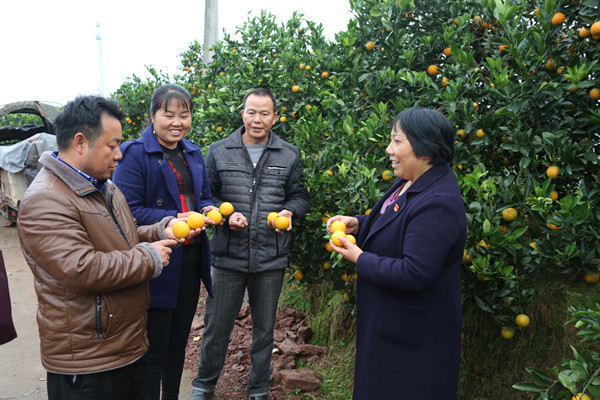 Hunan Rural College Students Telling Farmers How to Grow Oranges
Hunan Rural College Students Telling Farmers How to Grow Oranges
The cold winter was already being felt in Western Hunan by the end of November 2017 but Party Branch Secretary Long Siqing of Guchong Village, Zhijiang Dong Autonomous County in Huaihua City was full of warm smiles. She was still busy in the orange orchard. “Through the OUC, I have improved my knowledge level, widened my vision, and expanded the sales channels for the agricultural products in the village,” she said with some pride. Long Siqing, who is 50 years old, has worked hard and obtained a junior college diploma.
Long Siqing is a beneficiary of the OUC’s “One College Student Per Village” programme, through which she has not only obtained a junior college diploma in rural administration but also expanded the route to prosperity for the people in her mountainous region with what she has learned. A poverty-stricken village has been transformed into a demonstrative village in the construction of new rural areas. Guided by Long, the annual output value of oranges planted in the village has reached nearly 80 million yuan. The oranges from her village have been appraised among “the top 10 national brands of agricultural products” and have a share in the fruit markets in all the big cities in China. Long herself has been elected secretary of Guchong Village Party Branch Committee and delegate to the 17th and 18th CPC national congresses, and has been honoured with the title of “National Model Worker”.
The report of 19th CPC National Congress stated that continuous targeted poverty alleviation and and poverty liberation should be maintained. At the same time, “We will pay particular attention to helping people increase confidence in their own ability to lift themselves out of poverty and see that they can access the education they need to do so.” In an interview, OUC president Yang Zhijian said that this is the path the OUC has taken for over a decade. “The OUC has been in charge of the specific organisation and implementation of the “One College Student Per Village” programme since it was launched in 2004. The advantages of the OUC system have been brought into full play in order to benefit farmers and under-developed areas through the use of modern information technology approaches. Multiple measures have been taken to drive targeted poverty reduction through education, to enhance the supply and service of higher education, and to realise the cultivation of rural university students. Over the past decade, the “One College Student Per Village” programme has trained a host of practical rural professionals and leaders in achieving prosperity, people who are ‘educated with technological skills and management expertise’, and are fully recognised by the local governments and widely praised by the society.”
“As of the end of 2016, a total of 23 undergraduate and diploma specialties in seven categories have been set up, and 133 courses have been offered. About 570,000 students have been recruited and about 380,000 students have graduated,” Yang Zhijian said. “In line with the characteristics of rural areas, we have developed field classes offering courses in plant growing, animal breeding, management and service based on modern distance education approaches. The contents meet the actual needs of society, the economy, and production and the need for training new professional farmers in rural areas. Farmers can register for study with no need to transfer their permanent residence registration. They attend classes locally, learn autonomously, and accumulate credits. They are granted a nationally-recognised diploma once they get the required credits.”
Since the implementation of the “One College Student Per Village” programme, the tuition fee for each farmer university student has either been exempted or reduced by the OUC, shaping an inclusive system arrangement to provide higher education support to farmers. Poverty reduction programmes through education in each area are precisely connected with needy families. Meanwhile, preferential policies central and western regions of China and under-developed areas have been optimised in order to promote the balanced distribution of the “One College Student Per Village” programme. As of the end of 2016, the number of study centres in central and western regions had reached 967, accounting for 63.9 percent of the 1,513 county-level total for the “One College Student Per Village” programme in 42 OUC branches. This has greatly increased the coverage rate of higher education in remote backward areas. The “One College Student Per Village” programme has played a powerful driving role in decreasing the gap in higher education access in different regions and between urban and rural areas, and in promoting equal access to education.
 Rural College Students from Jiaxing in Zhejiang Obtaining OUC Degrees
Rural College Students from Jiaxing in Zhejiang Obtaining OUC Degrees
Statistics show that the OUC has trained a large number of high quality professionals since the implementation of the “One College Student Per Village” programme, which has improved the overall quality of available talent for the construction of rural grassroots organisations. Among the great many beneficiaries of this programme are Lin Meijuan, a deputy of the National People’s Congress, director of women’s affairs in Luokui Villagers’ Committee, Nanlin Township of Baoting Li and Miao Autonomous County in Hainan Province, and is a student majoring in rural administration; and Ge Lingteng, who serves as chairman of the board of Jiusuier Ecological Plantation, Tiantai County, Zhejiang Province, and is a student majoring in garden technology. At the same time, the proportion of rural college students who stay behind to work in their own hometowns has also improved. Tens of thousands of rural college students have become leaders in entrepreneurship and achieving prosperity in the new rural areas, giving impetus to the transformation and upgrading of rural industrial structures.
Today, more and more village cadres, responsible persons from cooperatives, and farmers attend the OUC big class in order to get an education before they can become pillars of the construction of new rural areas. More and more villages like Guchong have gradually taken the path to poverty alleviation and prosperity. The “One College Student Per Village” programme has flourished, stoking the flames of the farmers’ enthusiasm to change their present situation. As “messengers” connecting the urban and rural areas, they are changing rural outlooks with knowledge, developing agricultural production with technology, and shortening the urban-rural gap with action. They have injected fresh vitality into rural construction in the new era.
Quality education on the “Heavenly Road”: Operating the open university in remote ethnic minority areas
In 2012, having worked for over 10 years after graduating from junior college, Zhaxi entered the OUC School of Tibet (School of Tibet for short) at the suggestion of his friend. Two and a half years later, he obtained an undergraduate diploma, and in 2016, he got an offer from the graduate school. “You don’t have to quit your job or spend too much money. Thanks to the internet, you can study any undergraduate courses. Distance education provides a platform and opportunity for people who want to further studies, making lifelong learning no longer a dream.” Under the guidance of “building a learning society for all,” the School of Tibet brings quality educational resources to the Tibetan Plateau and offers opportunities for learners in Tibet to receive higher and lifelong education based on the real need for economic construction and social development.
On 16th September 2017, a signing ceremony on an Agreement to Provide Assistance for Tibet University in the Co-construction of an OUC Branch in Tibet during the 13th Five-Year Plan was held at Tibet University. The School of Tibet was thus formally renamed the OUC Tibet Branch, making it the OUC’s 45th branch school.
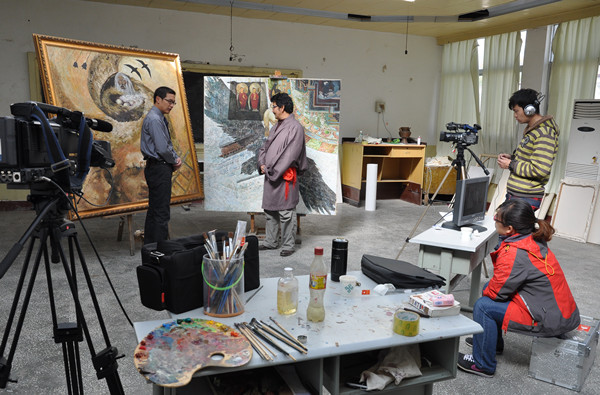
Recording Courses for Tibetan Students
Over the past 15 years, the OUC has provided the School of Tibet with a fund of nearly 12 million yuan by mobilising its overall school running organisation system, in addition to a large number of information technology devices and learning resources. The Tibet School has established five study centres, one each in Lhasa, Lhoka, Shigatse, Nyingchi, and Qamdo. It also launched seven undergraduate majors, including Chinese language and literature, accounting, and administrative management, and five junior college majors, including nursing and modern clerking. Cumulative total enrolment of 12,208 students has resulted in 7,076 graduates. During the 12th Five-Year-Plan period, the OUC assisted the construction of the School of Tibet and promoted comprehensive, multi-level assistance work through human, material, and financial resources. This further improved the school’s operating conditions, both in terms of quality and scale. It also cultivated a cohort of talents for the economic and social development of Tibet, and became an important part of the education movement in the autonomous region.
Yang Zhijian said that the OUC will continue to work together with Tibet University during the 13th Five-Year-Plan period. The OUC will treat the work of providing educational assistance for Tibet as a political task. It will enhance school operating conditions at both the Tibet Branch and its study centres, upgrade the level of educational informatisation, and improve the ability and quality of teachers and administrators. The OUC plans to integrate and share high-quality educational resources, build courses with Tibetan characteristics, and improve the quality of personnel training, all of which will transform the School of Tibet into an innovative OUC Tibet Branch. The OUC will leverage its systemic characteristics and advantages to develop targeted "group" assistance, define objectives and tasks, complete its phased annual tasks, explore a distance education training model suitable for Tibet, expand educational opportunities, promote educational equity, and develop the Tibet Branch into an important lifelong learning platform for Tibetan people.
As a new-style university committed to serving learning for all, the OUC pays special attention to rendering educational support for backwards areas and needy groups, and shows concern for the need for higher education in ethnic minority areas. China’s central and western regions experience unbalanced educational development, a lack of high-quality educational resources, and a shortage of teachers. In order to solve these problems, the OUC is taking the lead in pushing forward a strategic plan to construct OUC cloud classrooms based on cloud computing technology. The focus of construction is on the central and western poverty-stricken areas. Front-line study centres in central and western areas will be prioritised and high-quality educational resources will be distributed to students in need. The OUC has built five “cloud classrooms” at its Tibet Branch in order to meet the needs for sharing high quality resources.
The cloud classroom is a brand new concept created by the OUC. With the combination of both physical and virtual classrooms, cloud classrooms can achieve teaching synchronisation, sharing of recorded class resources, and multi-terminal access. It is able to effectively mitigate problems such as teacher shortage in remote areas and provide a better environment for teaching and learning. Since the OUC’s first cloud classroom came into service on 21st May 2012, the OUC has built a total of 314 cloud classrooms and 21 control centres in Xinjiang, Tibet, Qinghai, Gansu, and other western regions. The cloud classrooms cover 22 branches throughout the country, realising a connection between the headquarters, branches, local schools, and study centres.
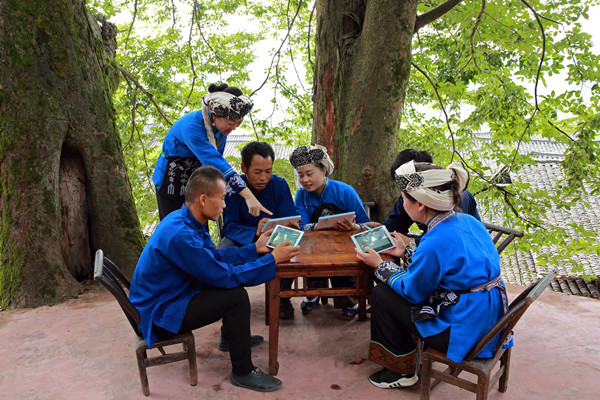 College Students from Minority Ethnic Groups Learn with “O Learning Pad” Mobile Learning Terminal
College Students from Minority Ethnic Groups Learn with “O Learning Pad” Mobile Learning Terminal
In order to adapt to the characteristics of the new era, the OUC has set up a distance education cloud platform dominated by learning and management systems on the basis of the cloud classroom. The platform supports access by 4 million students through mobile and desktop terminals. Active explorations have been made into mobile learning modes and the OUC “O Learning Pad” mobile learning terminal has been developed for pilot use among 19,000 rural college students in Hunan.
The OUC is currently accelerating the integration of information technology and education and teaching. By making use of the new technologies such as cloud computing and by relying on the infrastructure, basic networks, and data centres deployed by China’s telecom companies, the “cloud-network-terminal” three-in-one technological support model can bring high quality educational resources to remote ethnic minority areas.
Most beautiful poverty alleviation “Long-March Route”: The open university in old revolutionary base areas
“Train rural grassroots cadres free of charge, offer opportunities for continuing education to family members from registered households for poverty alleviation free of charge, cultivate skilled talents for industries and enterprises free of charge, offer vocational skills training free of charge ……” Some people may not believe that these things are a possibility. However, these are just some of the targeted poverty reduction through education measures the OUC is deploying in the “Long March Belt” areas.
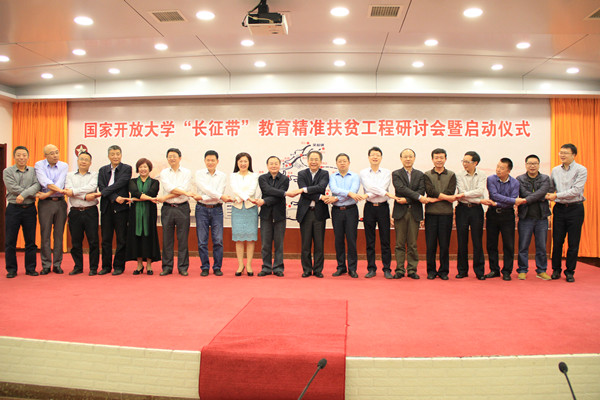 The “Long March Belt” of Targeted Poverty Reduction through Education is Launched in Ganzhou in Jiangxi
The “Long March Belt” of Targeted Poverty Reduction through Education is Launched in Ganzhou in Jiangxi
In response to China’s targeted poverty alleviation strategy, the OUC initiated the “Long March Belt”, a project for targeted poverty alleviation through education in Jiangxi’s Ganzhou in April 2017. This is the OUC’s customised targeted poverty alleviation project designed by bringing together the OUC’s advantages in distance education, operating system, information technology, and learning resources in light of the actual needs of old revolutionary base areas. It embodies the OUC’s educational philosophy, distinctive advantages, and sentiment for the old revolutionary base areas.
The implementation of the “Long March Belt” is the OUC’s answer to the nation’s call to engage in targeted poverty alleviation through education to key poverty-stricken counties in provinces and autonomous regions along the Red Army’s Long March route. Yang Zhijian has said that “the goal is to spend about four years giving directed assistance to about 30 key poverty-stricken counties for national poverty alleviation in 12 provinces and autonomous regions along the Long March route so as to help old revolutionary areas fundamentally get rid of poverty and become a moderately prosperous society together with the rest of the country.”
In order to ensure the smooth progress of the “Long March Belt”, the OUC has set up a leading group to strengthen coordination and planning and to engage in top-level design. An implementation plan and regulations have been successfully created. Meanwhile, the fund guarantee has been enhanced and a special fund has been established to increase financial support for the “Long March Belt.” According to Yang Zhijian, “To date, 26 key poverty-stricken counties for national poverty alleviation, including Ruijin and Shangyou in Jiangxi and Yongshun in Hunan, have been included in the ‘Long March Belt’.” In autumn 2017, 24 study centres assisted by the “Long March Belt” project launched degree education recruitment for the first time and a total of 1,687 students from impoverished families were enrolled.
On 27th September 2017, Sichuan’s Cangxi Radio and TV University (RTVU) held an opening ceremony of the first degree improvement class for village cadres, which is based on the “Long March Belt”. “We will step up our efforts to improve the OUC’s Cangxi Study Centre to make it an incubator for targeted poverty reduction through education.We will successfully build a cloud classroom, a computer room, a demonstration for the National E-learning Resource Centre, and a studio in Cangxi Study Centre. Thanks to the OUC’s “Long March Belt” project, Cangxi RTVU has got on ‘the MU train’ of poverty alleviation. Our school has gained a powerful driving force for development and obvious achievements have been made. This has also greatly promoted Cangxi’s local economic and social development,” said President Che Mengliang of Cangxi RTVU.
As one of the first pilot counties of the OUC’s “Long March Belt” project of targeted poverty alleviation through education, rural grassroots cadres in Cangxi are able to realise their university dreams. Moreover, the OUC’s great operational strength — “low cost with great effect” — and the role of distance education in targeted poverty alleviation and liberation can be brought into full play. This will help train more rural grassroots cadres and high quality skilled talents who are well informed about policies and theories, good at management, willing to stay behind, and expert at business operation to facilitate an early realisation of the goal of building a moderately prosperous society in an all-round way in old revolutionary base areas and remote areas.
The OUC has also included Qinglong Manchu Autonomous County and Weixian County in Hebei province in the project of targeted poverty reduction through education. On 2nd June 2017, Yang Zhijian led a visit to the administrative centre of Qinglong Country and conducted a meeting on how to implement the “Long March Belt” project in Qinglong County with a one-on-one match for each specific measure. Furthermore, the OUC has donated books worth one million yuan to Weixian County in cooperation with public welfare foundations and related publishing houses. It has also provided assistance to the OUC Book House project in order to enrich the reading resources of the local people and to promote local cultural advancement and development.
The report of the 19th CPC National Congress states that “We should mobilise the energies of our whole Party, our whole country, and our whole society, and continue to implement targeted poverty reduction and alleviation measures.” The report also states, “We will improve continuing education, step up efforts to build a learning society, and promote the well-rounded development of all our people.” As a new type of university, the OUC will continue to make the promotion of educational equality its mission and run a “university around the common people.” Yang Zhijian indicated that, “Today, under the guidance of the national strategy of internet+, the OUC will make further efforts to gather high-quality educational resources and use information technology to make them more favourable to grassroots rural areas, weak schools, poverty-stricken areas, and needy groups. Our aim is to have everyone enjoy fair quality education and to bring education to those in great need in society!”
By Li Qiang, Sun Fuwan, Su Junqi , Special Edition of CPPCC News